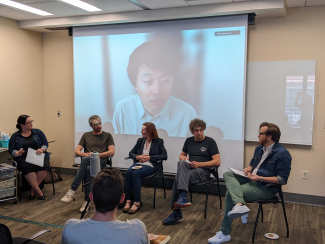From left to right: JILA postdoctoral researcher Rachael Merritt, former JILAn and W. M. Keck Lab Director Curtis Biemborn, JILA Fellow Margaret Murnane, JILA Fellow Graeme Smith, JILA Fellow Shuo Sun (virtual), and JILA postdoctoral researcher Jake Higgins
JILA's Postdoc Group, an internal organization supporting postdoctoral researchers within JILA, held a career panel titled: "Insights for Applying for Faculty Positions as a Postdoctoral Researcher." The panel featured three JILA Fellows: Margaret Murnane, Shuo Sun, Graeme Smith, and J. Curtis Beimborn II, the Director of the W.M. Keck Laboratory at JILA, who recently accepted a faculty position on the East Coast.
For an hour, the audience of postdocs and graduate students listened as the panelists shared experiences on several different topics, ranging from preparing a stellar faculty application to owning an interview. Several different tips, from asking to guest lecture to getting teaching experience to expanding one's network, were explored as audience members asked in-depth questions about this career path.
Experts estimate that between 10-30% of Ph.D. holders (including postdocs) become tenure faculty, so the career path to this position can be difficult to navigate. Learning from experienced PIs and other scientists can give valuable advice and guidance to those looking to fulfill those roles in the future.
With the success and popularity of this faculty career panel, the JILA Postdoc Group is already beginning to plan out the next events to inform and support the institute's many postdocs.



 The Physics Frontiers Centers (PFC) program supports university-based centers and institutes where the collective efforts of a larger group of individuals can enable transformational advances in the most promising research areas. The program is designed to foster major breakthroughs at the intellectual frontiers of physics by providing needed resources such as combinations of talents, skills, disciplines, and/or specialized infrastructure, not usually available to individual investigators or small groups, in an environment in which the collective efforts of the larger group can be shown to be seminal to promoting significant progress in the science and the education of students. PFCs also include creative, substantive activities aimed at enhancing education, broadening participation of traditionally underrepresented groups, and outreach to the scientific community and general public.
The Physics Frontiers Centers (PFC) program supports university-based centers and institutes where the collective efforts of a larger group of individuals can enable transformational advances in the most promising research areas. The program is designed to foster major breakthroughs at the intellectual frontiers of physics by providing needed resources such as combinations of talents, skills, disciplines, and/or specialized infrastructure, not usually available to individual investigators or small groups, in an environment in which the collective efforts of the larger group can be shown to be seminal to promoting significant progress in the science and the education of students. PFCs also include creative, substantive activities aimed at enhancing education, broadening participation of traditionally underrepresented groups, and outreach to the scientific community and general public.